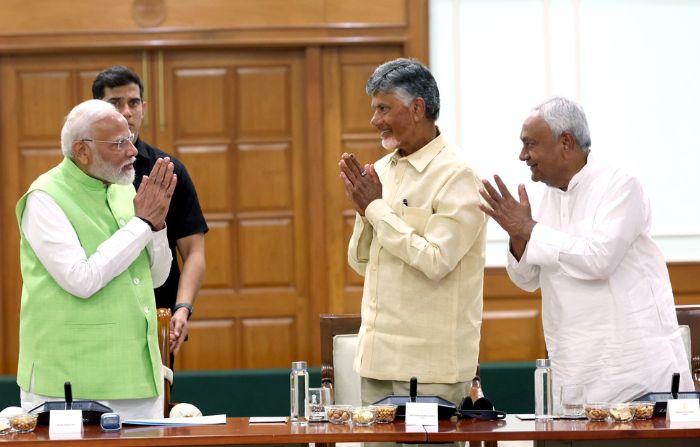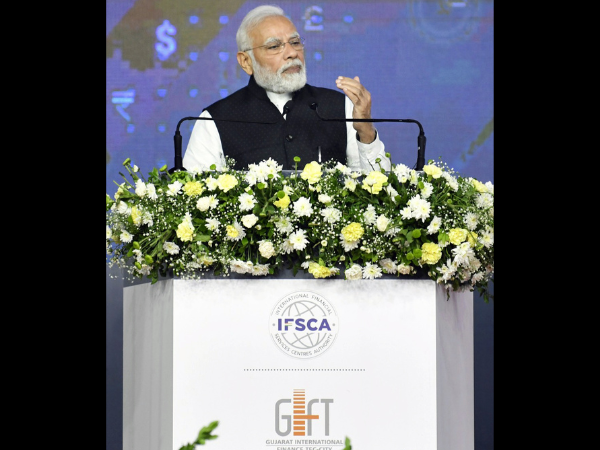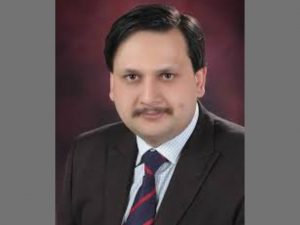- Thursday, April 03, 2025
The PM said before the general elections 2024 that India will become the third largest economy in his third term. Will the goal be achieved? What could be finance minister Sitharaman’s attention in the first full budget?

By: Shubham Ghosh
WITH Narendra Modi taking over as the prime minister of India for the third consecutive term, the focus has come back to his economic strategies. The leader, who over the last decade, enforced a series of reforms in the country’s economic sector and has guaranteed to make India the world’s third largest economy in his third term, has come back to power with help of his alliance partners since his Bharatiya Janata Party (BJP) failed to win a majority on its own.
This has given rise to speculation over the prime minister’s ability to continue with the same pace of economic reforms that he has exhibited since 2014.
India Weekly spoke with Rajesh Mehta, a leading business consultant and entrepreneur having more than 25 years of cross functional expertise, over how the economic trajectory of India would look under Modi 3.0 and what could be the probable challenges.
Read: Lack of jobs, high inflation hit Modi’s election appeal: survey
When asked whether the return of coalition politics would hinder Modi’s momentum in carrying out economic reforms, similar to those he did between 2014 and 2024, Mehta said it is unlikely to happen as long as the government takes its National Democratic Alliance (NDA) partners into “full confidence”.
“If it is an NDA led government, then it would be a success,” he said.
Mehta cited instances from the past saying India’s best economic reforms had taken place under coalition governments and even said that such governments could also help avoid measures that prove to be counter-productive.
Read: Modi’s reduced majority to hit fiscal policies: Moody’s
“Whether it was Narasimha Rao’s government or United Progressive Alliance 1 under Manmohan Singh, we had a coalition government but we also had massive economic reforms. If we had a coalition government in the past, we may have saved ourselves from blunders such as demonetisation,” he told India Weekly.
“India is now slowly returning back to coalition politics and consensus and trust between partners would be a key to success of future governments,” he added.
Speaking about the main areas in the economy where the Modi-led NDA government is expected to focus in the next five years, Mehta felt jobs and inflation would be the ones.
“For creating jobs, particularly in rural India, private-sector investment and investments on infrastructure would be given priority.
“India needs to become more competitive in the manufacturing sector. Hence, the ease of doing business needs to be further simplified and concepts like GiFT City would be taken up in other states. For getting jobs, skill development would also be a top priority of the government,” he added.

GiFT City or Gujarat International Finance Tec-City is a central business hub in the Ahmedabad district of the western Indian state of Gujarat.
Praising the Modi government saying it effectively enhanced a positive soft-power image of India in the last decade, Mehta said the same is expected to continue, particularly by engaging the diaspora.
“There would be a great push to make India a cultural centre of the world. We would see a lot of Indian cultural organisations expanding its footprint outside the country. With a very smart culture and tourism minister Gajendra Shekhawat in charge, I feel that India would be able to attract more tourists and become a culture superpower in times to come. The concepts of yoga, ayurveda and temple economy would also get a big push,” he added.
One of the Modi government’s key economic activities in the past decade has been to reach out to the corporate and micro, small and medium enterprises (MSME) sectors. Would his new government’s policies continue in the same direction?
“Corporate India & MSMEs should expect wide-ranging efforts and reforms to improve ease of doing business across sectors. Corporate India will also require more programmes, such as the defence corridor in Uttar Pradesh. However, India’s opaque tax practices have been a barrier to foreign companies. These may be reformed and amended,” Mehta said.
He feels the government would also encourage and support setting up of newer and better global capability, knowledge and R&D centres by various foreign multinationals in India. The inclusion of MSMEs and thrust to integrate them as part of corporate India should be an additional feature in this term,” he said, adding the corporate sector would also hope to see major land and labour reforms and the government can implement them by consensus.
One of the features of India’s coalition politics has been populism. In the past, parties were seen giving key ministries such as the railways to regional allies whereby they could milk them for populist gains in their own turf. Could that be in sight again in Modi 3.0, given the fact that his government is dependent on coalition partners?
While conceding that the new government would not see a major paradigm shift in its economic policies, Mehta felt the government could yet adopt populist measures to start with. He said that if Modi succeeds in managing his coalition allies effectively, more economic reforms would be seen on the ground.
“The government’s coalition partners such as N Chandrababu Naidu are smart and visionary and hence there would be no problem. Government needs to take the coalition partners and even the opposition in confidence to be able to proceed with any initiatives or reforms in this term,” Mehta said.

The first major budget of the new Modi government is likely to be delivered by finance minister Nirmala Sitharaman in July. Would she put a special emphasis on the dual challenges of employment and inflation since experts said they impacted the results of the recent general elections?
Mehta feels insights from the BJP’s election manifesto hint at some potential plans.
“There’s talk of expanding schemes such as Ayushman Bharat to cover senior citizens and introducing an insurance scheme to protect small traders and businessmen,” he said, adding, “The government believes its initiatives, such as boosting domestic manufacturing and improving infrastructure, have indirectly benefited the middle class.
“Despite calls for revising income tax slabs, it remains uncertain whether the government will adjust its approach to the new tax regime post-budget.”
Mehta also cited a leading Indian economist who said India’s main challenge isn’t creating jobs but reallocating capital to more labour-intensive sectors.

He added that the fact that jobs and inflation would receive the attention they deserve, immediately after the election, has made it painfully clear that not addressing them would lead to further electoral impact in coming elections.
Finally, India Weekly asked Mehta whether India eventually become the third-largest economy that Modi guaranteed before the elections and what the likely challenges for him in accomplishing the feat.
“India can definitely become the third-largest economy by the end of the decade if it is able to make a final balance between economic growth on one hand and helping the poor getting out of poverty on the other.
“Federalism needs to be promoted wisely and effectively. The current geopolitical situation would definitely push foreign companies to diversify from China and shift base to India. The young population and skilled manpower are India’s big assets. We need to spend more on innovation and R&D,” he said.